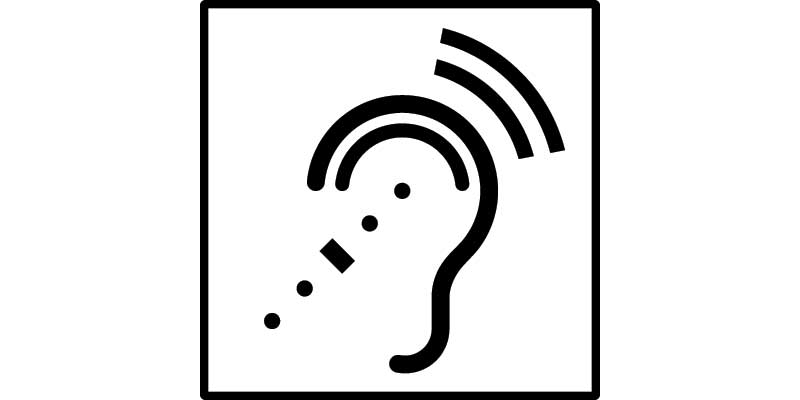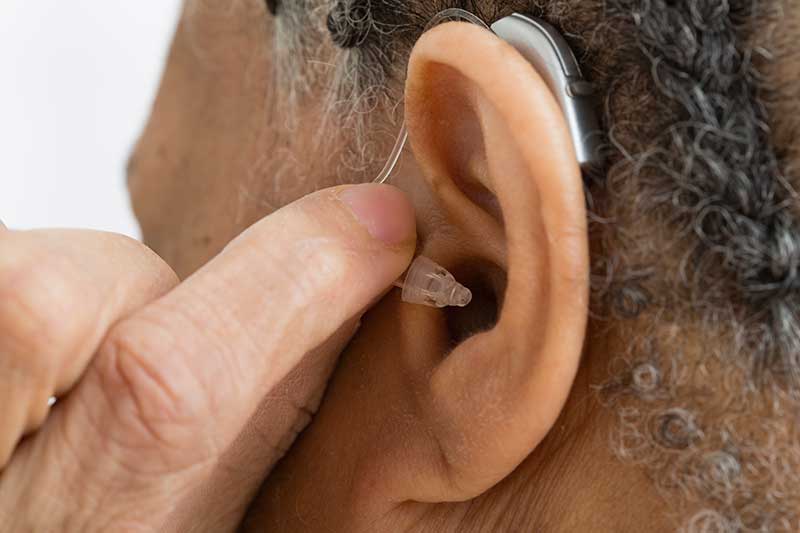Better Hearing Blog

Diet and Hearing, the Correlation.
While there is no evidence that dietary supplements prevent hearing loss or improve hearing, some studies suggest that a healthy diet is conducive to good hearing. One study found that a diet high in sugar and carbohydrates may impair hearing by adversely affecting vascular health. Another study found that women who ate fish at least twice a week were less likely to report hearing loss than non-fish consumers. The benefit may rest with omega-3 fatty acids found in fatty fish that may improve blood flow to the cochlea. Then there is the study that found that people who scored higher on the Healthy Eating Index had better hearing. Exercising and maintaining a healthy weight have also been linked with healthy hearing.
There are many ways to support and maintain healthy hearing. For example, protecting ears from noise pollution and getting a regular checkup from an audiologist, but nutrition also plays a key part in hearing preservation. Exercise matters, too, specifically with regard to cognitive ability and how the brain processes sound. To schedule a hearing assessment, please call BETTER HEARING CENTER. We are New Hampshire’s premier hearing care provider.
P.S. According to a 2015 study of nurses, there is a link between higher intakes of dietary beta-carotene (a potent antioxidant) and a lower risk of hearing loss.

Hardly Inconsequential
While some persist in viewing hearing loss as an inconsequential part of aging, significant hearing impairment has been linked with substantial physical, psychological, and social ramifications. These consequences include isolation, loneliness, depression, anxiety, falls and other accidents, and increased mortality rate. In addition to increasing friction between friends, workers, and family members, hearing loss contributes to cognitive decline and dementia. It is believed that hearing loss may compromise memory because additional effort is required to process auditory information. It is also possible that hearing loss and cognitive decline are both caused by shared factors, which means that both become simultaneously impaired. These are hardly inconsequential matters. Hearing impairment merits attention in terms of both diagnosis and treatment.
People “hear” with their brains, not their ears. When we have a hearing loss, the connections in our brain that respond to sound become reorganized. Fortunately, hearing aids can provide the sound stimulation needed for the brain to restore the normal organization of connections to its “sound center” so it can more readily react to the sounds that it had been missing. To schedule a hearing exam, please call BETTER HEARING CENTER. Let us help you get back to the world of hearing at New Hampshire’s premier hearing care provider.
P.S. Some research suggests that wearing a hearing instrument not only improves hearing, but also facilitates social interaction, reduces depression, and generally improves overall health.

Would You Like Some Assistance?
For those who would like to augment their hearing instruments with other devices that promote better hearing, the hearing specialist can suggest any of a number of “assistive listening devices” (ALDs). These apparatuses, which are often referred to as “binoculars for the ears,” utilize a microphone to pick up sound, transmission technology to deliver the signal, and a receiver to pick up the signal and deliver sound to the ear. They serve to both amplify sounds and eliminate unwanted background noise. One type of ALD system, known as “hearing loops,” can be found in theaters, conference rooms, and places of worship, while personal ALDs can be connected to the phone, TV, or other audio sources at home.
ALD’s are used by people with all degrees of hearing loss. This includes hearing aid users and cochlear implant users, as well as consumers who do not use either hearing aids or cochlear implants. To schedule an appointment, please call BETTER HEARING CENTER. Our expertise is measured by our commitment to patient satisfaction, continuing education, and the application of current technologies. New Hampshire’s premier hearing care provider.
P.S. The hearing loop, which is a wire that circles a room and is connected to the sound system, transmits the sound electromagnetically.

Making Friends with Anemones
“Hair cells” are sensory cells located in the inner ear that get their name from their hair-like projections, called “stereocilia.” Hair cells play a critical role in enabling us to hear because they sense sound waves and convert them to electrical signals that are sent to the brain. Unfortunately, once hair cells in the human ear die (due to noise exposure), they do not regenerate, and hearing is lost. However, recent research involving sea anemones (water-dwelling predatory animals named after the flowers) have the ability to regenerate hair cells with a specific protein. When scientists extracted this protein, they found it could regenerate hair cells in mammals, which is a finding that may someday benefit those with acute hearing loss.
For more information, please call BETTER HEARING CENTER. Our expertise is measured by our commitment to patient satisfaction, continuing education, and the application of current technologies. After the age of 50, a regular hearing test should be considered as important as one’s yearly physical checkup. We are the only hearing center that has served the Concord, New Hampshire, area for more than 55 years. New Hampshire’s premier hearing care provider.
P.S. Sea anemones have the miraculous ability to repair themselves after they have been torn in half.

Hyperacusis: Those Hypersensitive to Sounds
The term “hyperacusis” is used to describe people who find the sounds of everyday life to be intrusively loud, uncomfortable, and even painful. It is conservatively estimated that about two percent of the population suffers from this problem. A minority of this percentage is severely affected, while the rest report that hyperacusis makes it difficult for them to concentrate or promotes tension or even anger. This hypersensitivity to everyday sounds has been linked with tinnitus (ringing in the ears), migraines, head injury, Lyme disease, William’s syndrome, and Bell’s palsy. It is important that symptoms of hyperacusis be reported and any potentially related medical diagnosis be ascertained. Contrary to common belief, treatment of hyperacusis rests with sound therapy, not earplugs.
Sound therapy can retrain the auditory processing center of the brain to accept everyday sounds. This involves the use of a noise-generating device worn on the affected ear or ears. Those suffering from hyperacusis may be uncomfortable with placing sound directly in their ear, but the device produces “white noise” that is barely audible. To schedule a hearing assessment, please call BETTER HEARING CENTER. We are New Hampshire’s premier hearing care provider.
P.S. Sound training for treating hyperacusis consists of slowly and gently reintroducing sounds to those who have shut themselves off from the everyday sounds that they find so irritating.

Custom Molded to Your Ear
Just as eyeglass frames with prescription lenses must be properly fitted to the wearer’s face, a hearing instrument’s earmold must fit perfectly in the listener’s ear. To get the fit that will literally place the sound of the hearing instrument in the ear, a hearing specialist will make a cast (known as an “impression”) of the ear. After the working earmold is made from this impression, it will be adjusted to prevent any “feedback” problems that might arise from a loose fit that allows unwanted sounds to leak past the earmold and into the ear. Additional modifications may also be made to address any “occlusion effect” (muffled sounds) or any perception that the user’s own voice is too loud.
The future of the hearing industry is bright. There is amazing technology already available in modern hearing instruments, and there are no limits to the technological advances that will be available in a few short years. To schedule an appointment, please call BETTER HEARING CENTER. Our expertise is measured by our commitment to patient satisfaction, continuing education, and the application of current technologies. Don’t delay the enjoyment of the sounds in your life any longer. Come in and let us help you get back to the world of hearing. New Hampshire’s premier hearing care provider.
P.S. An earmold can be canal size (tiny), half-shell size (medium), or even “full shell” size (large), depending on the wearer’s type and degree of hearing loss and anatomy.

